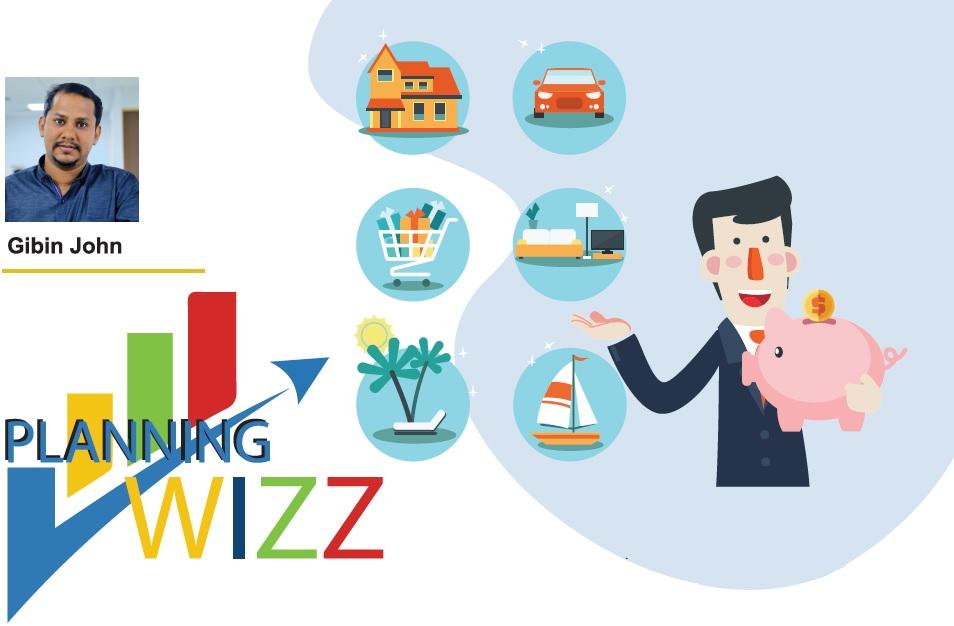
Geojit’s Investment Analyst, Gibin John, helps a couple with their financial planning. He advices them on how they can plan for their children’s higher education, manage their loans and accumulate a corpus for retirement.
Aged 45, I am working for a private firm. My wife, 39 years old, is working for a bank. We have a son and a daughter. They are studying in the 10th and 7th standards respectively. My monthly take home salary is Rs.60,000 and wife’s salary is Rs 63,000. Our family monthly expenses are Rs.55,000, including the home loan EMI of Rs.25000 and a car loan EMI of Rs.7000.The outstanding home loan is Rs.5,50,000 and car loan is Rs.20,000.These loans will end in seven and three years respectively. We are also paying Rs.10,000 as insurance premium for Rs.2.5 lakh sum assured. This will end in 2022.The maturity amount will be approximately Rs.4 lakh. Till now we have not made any systematic investment. The surplus amount is saved in our saving account and invested in fixed deposits. Two years ago, I started a recurring deposit for 5 years and I am investing Rs.10,000 per month. We have a house worth Rs.80 lakh, fixed deposit of Rs.5 lakh, mutual fund worth Rs.2 lakh, shares worth Rs.1.5 lakh and Rs2 lakh in savings account. My goals are:
- I am planning to retire from the current job at age of 54 and start a new business, which is related to my current job. For starting this business, I am expecting an initial cost of Rs.12 lakh and expected income from this is Rs.40,000 per month initially.
- We want Rs.5 lakh each for the children’s higher education.
- For daughter’s marriage we require, Rs.10 lakh at her age of 25.
- Advise us whether it is beneficial if we close the loans early.
Please give your suggestions on how to invest the surplus amount properly to achieve our objectives.
Gibin John, a certified financial planner replies:
It is good to see you have already achieved one of your life goals, that is a dream home and its liability will end in seven years. Like many young couples today you both have a relatively good income but are still struggling to manage personal finances. This is due to of lack of proper financial planning. Personal finance is all about meeting personal financial goals, whether it’s for short-term financial needs, planning for retirement, or saving for your children’s college education and marriage. If you plan properly then you can invest for fulfilling your financial goals.
Take into consideration your home loan, if you had planned properly, by now you could have closed the loan as well as created a considerable corpus. Even now it’s not too late. Prudent planning can shape a secure financial future.
Your total monthly family income is Rs.1,23,000. After paying obligations, investments and living expenses you have surplus amount of Rs.57,167. You can achieve your goals by properly allocating the surplus amount for different goals as well as towards investments.
Your immediate goal is to create a corpus of Rs.5 lakh for your son’s higher education which is two years away. If we assume 8% inflation on this expected amount, it would become around Rs.6 lakh in two years. Since this is a short term goal you can’t choose high risk investments. So, for accumulating this amount you should invest Rs.23,000 in less risky investments like RD, PSU Debt funds etc. which can generate around 6.5% return. You also need to accumulate a corpus for your daughter’s higher education. By that time, which is five years from now, her education cost would be around Rs.7.5 lakh. You can accumulate this corpus by continuing to invest Rs 23000 for three more years.
You are expecting an expense of Rs.10 lakh for your daughter’s wedding when she is 25 years old. If we assume the cost to go up 6% annually, then the wedding cost would be around Rs.18 lakh after 10 years. For creating this corpus within this period, you should invest Rs.10,000 per month. Considering your age and goal period we suggest you invest in a hybrid mutual fund which invests partly in equity and debt. Expected return from this investment is 8%.
You have asked for suggestions for early closure of loans but you have not provide all the loan details. So we are unable to provide you with proper guidance. But based on the details you have provided we assume that you will be paying off the home loan soon. Now the major portion of the EMI now goes to the principle amount and also the interest portion of the home loan will get you tax benefit. Part payment into loan helps in the early years of loan. In your case since the loan tenure is closer to the end, we recommend you to continue. Car loan interest is comparatively higher than the home loan and there is no other benefit from this EMI payment. So you may close this loan by using any of your investment, since you are losing more on loan interest than earnings on your investments. If you close the loan, the amount used to pay the EMI can be invested for wealth creation.
As a thumb rule it is always wise to keep an amount equal to five to six times of your monthly expense as a contingency fund. In your case, you may categorize your existing saving and fixed deposits for meeting emergency situations. So mark these two investments as emergency fund.
Another important goal is creation of retirement corpus. You are planning to retire from the current job at the age of 54 and start a new business. You are expecting a monthly income of Rs. 40000 from this new business. This is a good idea which will help you to get an income after the actual retirement age also. But this monthly income will not be sufficient to meet your post retirement expenses. So you have to create a retirement corpus for meeting all expenses in post retirement period. For this calculation, your wife’s age is considered and assuming that she would work till the age of 56. Your current monthly expenses of Rs.20000 will become Rs.54000 at that time, considering an inflation of 6%. You will have to create a retirement corpus of Rs.1,38,92,350 to meet her expenses till 80 years. For accumulating this amount you should invest Rs.27,000 every year till her retirement age, that is for the next 16 years. You may use the current surplus for this purpose.
Since you plan to retire early, the health insurance provided by your company will stop. So, you should consider taking a health insurance policy to take care of the medical expenses you may incur. You should take a family floater policy of at least Rs.10 lakh immediately and continue the same along with company provided plans. Both of you are working and are contributing to investments and liability repayments. So you and your wife should take an insurance term plan of Rs.50 lakh each. This will help you to protect your family from any unexpected events. Covering risk is primary requirement. Investments comes next.









